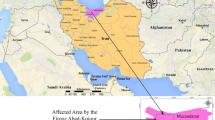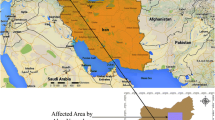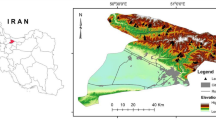Abstract
Rockfalls pose serious threats to human beings, structures, and lifelines. In the present research, a model was developed to predict the possibility of seismic rockfalls on a regional scale. For this purpose, three models including logistic regression (LR), a multilayer perceptron artificial neural network (MLP), and a radial basis function artificial neural network (RBF) were employed. Bivariate logistic regression is a multivariable statistical method that provides a mathematical model using independent variables to predict the occurrence probability of a given phenomenon at a certain location. Although artificial networks of RBF and MLP are pretty similar, there are some structural differences in the components between these two neural networks. The earthquake of Changureh-Avaj in 2002 was used as a basis and benchmark for the model presented in this work. The sustainable zones predicted by LR, MLP, and RBF methods were compared with a database (distribution map) of seismic rockfalls. The results showed good overlap between RBF-predicted rockfall susceptibility zones and database (distribution map) of seismic rockfalls. Besides, in order to evaluate the statistical results of LR, MLP, and RBF models, the verification parameters with high accuracy such as density ratio (Dr), quality sum (Qs), and Receiver Operating Characteristic Curve (ROC) were used. By analyzing the susceptibility maps and considering the Qs index obtained by LR (2.94) and MLP (3.482), and RBF (4.344), it could be observed that the Qs of RBF were higher than that of LR and MLP. Moreover, based on the obtained value of AUC from LR (0.859), MLP (0.910), and RBF methods (0.956), it is seen that the RBF method provided a higher accuracy in predicting the probability of rockfalls occurrence caused by the earthquake of Changureh-Avaj in 2002 compared to LR and MLP methods.














Similar content being viewed by others
References
Agliardi F, Crosta GB, Frattini P (2009) Integrating rockfall risk assessment and countermeasure design by 3D modelling techniques. Nat Hazards Earth Syst Sci 9(4):1059
Ayalew L, Yamagishi H (2005) The application of GIS-based logistic regression for landslide susceptibility mapping in the Kakuda-Yahiko Mountains, Central Japan. Geomorphology 65(1):15–31
Bednarik M, Magulová B, Matys M, Marschalko M (2010) Landslide susceptibility assessment of the Kraľovany–Liptovský Mikuláš railway case study. Physics and Chemistry of the Earth, Parts A/B/C 35(3):162–171
Budimir MEA, Atkinson PM, Lewis HG (2015) A systematic review of landslide probability mapping using logistic regression. Landslides 12(3):419–436
Cancelli A, Crosta G (1993) Rockfall hazard and risk mapping. In: Proceedings 7th International Conference and Field Workshop on Landslides, Czech-Slovak Rep., Balkema, 69–76
Caniani D, Pascale S, Sdao F, Sole A (2008) Neural networks and landslide susceptibility: a case study of the urban area of Potenza. Nat Hazards 45(1):55–72
Capolongo D, Refice A, Mankelow J (2002) Evaluating earthquake-triggered landslide hazard at the basin scale through GIS in the upper Sele river valley. Surv Geophys 23(6):595–625
Castelli F, Cavallaro A, Grasso S, Lentini V (2016) Seismic microzoning from synthetic ground motion earthquake scenarios parameters: the case study of the City of Catania (Italy). Soil Dyn Earthq Eng 88:307–327
Chau KT, Wong RHC, Liu J, Lee CF (2003) Rockfall hazard analysis for Hong Kong based on rockfall inventory. Rock Mech Rock Eng 36(5):383–408
Chauhan S, Sharma M, Arora MK (2010) Landslide susceptibility zonation of the Chamoli region, Garhwal Himalayas, using logistic regression model. Landslides 7(4):411–423
Clague JJ, Stead D (Eds.) (2012). Landslides: types, mechanisms and modeling. Cambridge University Press, 436 pp
Constantin M, Bednarik M, Jurchescu MC, Vlaicu M (2011) Landslide susceptibility assessment using the bivariate statistical analysis and the index of entropy in the Sibiciu Basin (Romania). Environmental Earth Sciences 63(2):397–406
Corominas J, Copons R, Moya J, Vilaplana JM, Altimir J, Amigó J (2005) Quantitative assessment of the residual risk in a rockfall protected area. Landslides 2(4):343–357
Corominas J, Mavrouli O, Ruiz-Carulla R (2017) Rockfall occurrence and fragmentation. In: Workshop on World Landslide Forum. Springer, 75–97
Cox DR (1958) The regression analysis of binary sequences. J R Stat Soc Ser B Methodol 20(2):215–242
Crosta GB, Agliardi F (2003) Failure forecast for large rock slides by surface displacement measurements. Can Geotech J 40(1):176–191
Cruden DM, Varnes DJ (1996) Landslide types and processes. In Landslides: Investigation and Mitigation, ed. A. K. Turner and R. L. Schuster. Transportation Research Board, Special Report 247, 36–75
Dashti Marvily M (2008) Landslide hazard zoning using logistic regression (Case Study:A Part of Gamasiab Watershed). M.Sc Thesis. Tarbiat Modares University, [in Persian], 92 pp
Del Gaudio V, Wasowski J (2004) Time probabilistic evaluation of seismically induced landslide hazard in Irpinia (southern Italy). Soil Dyn Earthq Eng 24(12):915–928
Del Gaudio V, Pierri P, Wasowski J (2003) An approach to time-probabilistic evaluation of seismically induced landslide hazard. Bull Seismol Soc Am 93(2):557–569
Ercanoglu M, Gokceoglu C (2002) Assessment of landslide susceptibility for a landslide-prone area (north of Yenice, NW Turkey) by fuzzy approach. Environ Geol 41:720–730
Ermini L, Catani F, Casagli N (2005) Artificial neural networks applied to landslide susceptibility assessment. Geomorphology 66(1):327–343
Fatemi Aghda SM, Sarikhani R, Teshneh Lab M (2003) Landslide zonation in Talesh area using the expert systems (MLP network). Journal of Engineering Geology, [in Persian] 1(2):179–192
Garsia-Rodríguez MJ, Malpica JA, Benito B, Díaz M (2008) Susceptibility assessment of earthquake-triggered landslides in El Salvador using logistic regression. Geomorphology 95(3):172–191
Gee MD (1992) Classification of landslide hazard zonation methods and a test of predictive capability. Proceedings of 6th international symposium on landslides, Christchurch. New Zealand 2:947–952
Gomez H, Kavzoglu T (2005) Assessment of shallow landslide susceptibility using artificial neural networks in Jabonosa River basin, Venezuela. Eng Geol 78(1):11–27
Gosar A (2017) Earthquake-Induced rockfalls caused by 1998 Mw5. 6 Earthquake in Krn Mountains (NW Slovenia) and ESI 2007 Intensity Scale. In: Workshop on World Landslide Forum. Springer, 131–139
Hagan MT, Demuth HB, Beale MH, Jesús OD (2014) Neural network design. Martin Hagan (2 edition), 1012 pp
Hungr O, Evans SG, Hazzard J (1999) Magnitude and frequency of rock falls and rock slides along the main transportation corridors of southwestern British Columbia. Can Geotech J 36(2):224–238
Jaboyedoff M, Dudt JP, Labiouse V (2005) An attempt to refine rockfall hazard zoning based on the kinetic energy, frequency and fragmentation degree. Natural Hazards and Earth System Science 5(5):621–632
Jibson RW, Harp EL, Michael JA (2000) A method for producing digital probabilistic seismic landslide hazard maps. Eng Geol 58(3):271–289
Keefer DK (1984) Landslides caused by earthquakes. Geol Soc Am Bull 95(4):406–421
Lari S, Frattini P, Crosta GB (2014) A probabilistic approach for landslide hazard analysis. Eng Geol 182:3–14
Lee S, Sambath T (2006) Landslide susceptibility mapping in the Damrei Romel area, Cambodia using frequency ratio and logistic regression models. Environ Geol 50(6):847–855
Lee S, Ryu JH, Won JS, Park HJ (2004) Determination and application of the weights for landslide susceptibility mapping using an artificial neural network. Eng Geol 71(3):289–302
Lee S, Ryu JH, Lee MJ, Won JS (2006) The application of artificial neural networks to landslide susceptibility mapping at Janghung, Korea. Math Geol 38(2):199–220
Lee CT, Huang CC, Lee JF, Pan KL, Lin ML, Dong JJ (2008) Statistical approach to earthquake-induced landslide susceptibility. Eng Geol 100(1):43–58
Mahdavifar MR, Solaymani S, Jafari MK (2006) Landslides triggered by the Avaj, Iran earthquake of June 22, 2002. Eng Geol 86(2):166–182
Mahdavifar M, Askari F, Memarian P, Seyedimorad SM (2016) Earthquake-induced rock fall hazard zonation of Varzegha-Ahar region in Northwest Iran: a comparison of quantitative and qualitative approaches. Journal of Seismology and Earthquake Engineering 18(2):101–116
Marzorati S, Luzi L, De Amicis M (2002) Rock falls induced by earthquakes: a statistical approach. Soil Dyn Earthq Eng 22(7):565–577
Massey CI, MacSaveney MJ, Richards L (2015) Characteristics of some Rockfalls triggered by the 2010/2011 Canterbury earthquake sequence, New Zealand. Engineering Geology for Society and Territorym, Springer 2:1943–1948
Mathew J, Jha VK, Rawat GS (2009) Landslide susceptibility zonation mapping and its validation in part of Garhwal lesser Himalaya, India, using binary logistic regression analysis and receiver operating characteristic curve method. Landslides 6(1):17–26
Menhaj MB (2003) Basics of artificial networks: computation intelligence. Amir Kabir University press, [in Persian], 716 pp
Miles SB, Keefer DK (2009a) Evaluation of CAMEL—comprehensive areal model of earthquake-induced landslides. Eng Geol 104(1):1–15
Miles SB, Keefer DK (2009b) Toward a comprehensive areal model of earthquake-induced landslides. Natural hazards review 10(1):19–28
Mohammady M, Pourghasemi HR, Pradhan B (2012) Landslide susceptibility mapping at Golestan Province, Iran: a comparison between frequency ratio, Dempster–Shafer, and weights-of-evidence models. J Asian Earth Sci 61:221–236
Motamedi M, Liang RY (2014) Probabilistic landslide hazard assessment using copula modeling technique. Landslides 11(4):565–573
Nefeslioglu HA, Gokceoglu C, Sonmez H (2008) An assessment on the use of logistic regression and artificial neural networks with different sampling strategies for the preparation of landslide susceptibility maps. Eng Geol 97(3):171–191
Norusis MJ (1994) SPSS Advanced Statistics 6.1. SPSS Company, Chicago 606 pp
Peng WF, Wang CL, Chen ST, Lee ST (2009) Incorporating the effects of topographic amplification and sliding areas in the modeling of earthquake-induced landslide hazards, using the cumulative displacement method. Comput Geosci 35(5):946–966
Petley DN (2012) Landslides and engineered slopes: protecting society through improved understanding. Landslides and engineered slopes 1:3–13
Pourghasemi HR, Pradhan B, Gokceoglu C, Moezzi KD (2012a) Landslide susceptibility mapping using a spatial multi criteria evaluation model at Haraz watershed, Iran. In: Terrigenous mass movements. Springer, Berlin, pp 23–49
Pourghasemi HR, Pradhan B, Gokceoglu C (2012b) Application of fuzzy logic and analytical hierarchy process (AHP) to landslide susceptibility mapping at Haraz watershed, Iran. Nat Hazards 63(2):965–996
Pourghasemi HR, Mohammady M, Pradhan B (2012c) Landslide susceptibility mapping using index of entropy and conditional probability models in GIS: Safarood Basin, Iran. Catena 97:71–84
Pourghasemi H, Pradhan B, Gokceoglu C, Moezzi KD (2013) A comparative assessment of prediction capabilities of Dempster–Shafer and weights-of-evidence models in landslide susceptibility mapping using GIS. Geomatics, Natural Hazards and Risk 4(2):93–118
Pradhan B (2013) A comparative study on the predictive ability of the decision tree, support vector machine and neuro-fuzzy models in landslide susceptibility mapping using GIS. Comput Geosci 51:350–365
Rapolla A, Paoletti V, Secomandi M (2010) Seismically-induced landslide susceptibility evaluation: application of a new procedure to the island of ischia, Campania region, southern Italy. Eng Geol 114(1):10–25
Regmi NR, Giardino JR, McDonald EV, Vitek JD (2014) A comparison of logistic regression-based models of susceptibility to landslides in western Colorado, USA. Landslides 11(2):247–262
Rodrıguez CE, Bommer JJ, Chandler RJ (1999) Earthquake-induced landslides: 1980–1997. Soil Dyn Earthq Eng 18(5):325–346
Shariat Jafari M (2009) Specific risk zonation of landslides in the critical (Central Alborz) zones. National Disaster Mitigation Organization. A specialized workshop of earthquake and landslide, [in Persian], 95 pp
Shroder JF (2015) Landslide hazards, risks, and disasters. Elsevier Academic Press, 475 pp
Solaymani S, Feghhi K (2003) Report of Surface Faulting and Morphotectonics of Avaj Region Earthquake on June 22, 2002. International Institute of Earthquake Engineering and Seismology, [in Persian], 1–11
Straub D, Schubert M (2008) Modeling and managing uncertainties in rock-fall hazards. Georisk 2(1):1–15
Swets JA (1988) Measuring the accuracy of diagnostic systems. Science 240(4857):1285–1293
Tchalenko JS (1974) Materials for the study of seismotectonics of Iran: North-Central Iran (No. 29). Geological Survey of Iran
Turner AK, Jayaprakash GP (2012) Introduction. Rockfall characterization and control. Transportation Research Board. National Academy of Sciences, Washington D.C., pp 3–20
Uchida T, Osanai N, Onoda S, Takayama T, Tomura K (2006) A simple method for producing probabilistic seismic shallow landslide hazard maps. In Proceedings of Interpraevent, Universal Academy Press. 2, 529–534
Valagussa A, Frattini P, Crosta GB (2014a) Quantitative probabilistic hazard analysis of earthquake-induced rockfalls. In: Landslide Science for a Safer Geoenvironment, Springer, 213–218
Valagussa A, Frattini P, Crosta GB (2014b) Earthquake-induced rockfall hazard zoning. Eng Geol 182:213–225
Varnes DJ (1978) Slope movement types and processes. Special report 176:11–33
Wasowski J, Del Gaudio V (2000) Evaluating seismically induced mass movement hazard in Caramanico Terme (Italy). Eng Geol 58(3):291–311
Wyllie DC (2014) Rock fall engineering. CRC Press, 270 pp
Yesilnacar EK (2005) The Application of Computational Intelligence to Landslide Susceptibility Mapping in Turkey, Ph.D Thesis. Department of Geomatics the University of Melbourne, 423pp
Yilmaz I (2009) Landslide susceptibility mapping using frequency ratio, logistic regression, artificial neural networks and their comparison: a case study from Kat landslides (Tokat—Turkey). Comput Geosci 35(6):1125–1138
Yin KL, Yan TZ (1988) Statistical prediction model for slope instability of metamorphosed rocks. In: Proceedings of the 5th international symposium on landslides, Lausanne, Switzerland, AA Balkema Rotterdam, The Netherlands. 2, 1269–1272
Author information
Authors and Affiliations
Corresponding author
Rights and permissions
About this article
Cite this article
Bagheri, V., Uromeihy, A. & Fatemi Aghda, S.M. Predicting the probability of rockfalls occurrence caused by the earthquake of Changureh-Avaj in 2002 using LR, MLP, and RBF methods. Bull Eng Geol Environ 78, 3119–3141 (2019). https://doi.org/10.1007/s10064-018-1323-5
Received:
Accepted:
Published:
Issue Date:
DOI: https://doi.org/10.1007/s10064-018-1323-5




